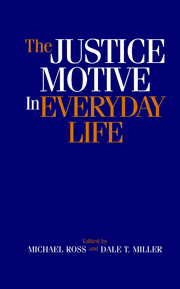Book contents
- Frontmatter
- Contents
- List of Contributors
- Introduction
- Theoretical Perspectives on the Justice Motive
- Victim Derogation and the Belief in a Just World
- The Justice Motive and Prosocial Behavior
- Justice-Based Reactions to Transgressors
- Justice and Reaction to One's Own Fate
- 20 Belief in a Just World as personal Resource in School
- 21 Awaking to Discrimination
- 22 Deservingness and Perceptions of Procedural Justice in Citizen Encounters with the Police
- 23 Fairness Judgements as Cognitions
- Name Index
- Subject Index
20 - Belief in a Just World as personal Resource in School
Published online by Cambridge University Press: 08 September 2009
- Frontmatter
- Contents
- List of Contributors
- Introduction
- Theoretical Perspectives on the Justice Motive
- Victim Derogation and the Belief in a Just World
- The Justice Motive and Prosocial Behavior
- Justice-Based Reactions to Transgressors
- Justice and Reaction to One's Own Fate
- 20 Belief in a Just World as personal Resource in School
- 21 Awaking to Discrimination
- 22 Deservingness and Perceptions of Procedural Justice in Citizen Encounters with the Police
- 23 Fairness Judgements as Cognitions
- Name Index
- Subject Index
Summary
Students Often Complain About Being Treated Unfairly In School. Some Argue That They Deserve Another Grade. Others Feel That They Have Been Punished Unfairly While Other Pupils Who Behaved More Inappropriately Were Reproved Less. If Students Are Asked To Describe A Good Teacher, Fairness Is Usually One Of The Top Three Characteristics (See Hofer, Pekrun, & Zielinski, 1986). Furthermore, Gage And Berliner (1996) Claim That Unfair Grades Significantly Decrease Students' Achievements. Thus, For Those Who Deal With Everyday Classroom Problems, Dealing With Unfairness And The Consequences Of Unfairness Is A Central Issue. Nevertheless, There Are Few Examples Of Justice Psychology Being Applied In The School Context. This Is A Great Pity. Justice Psychology And, In Particular, Justice Motive Theory Could Significantly Enhance Our Knowledge Of Justice Concerns In School. Melvin Lerner Was The First To Describe The Justice Motive Theory. He Proposed (1965, 1970; Lerner & Simmons, 1966) That People Have The Need To Believe In A Just World In Which All People, Including Themselves, Get What They Deserve And Deserve What They Get. This Belief In A Just World (Bjw) Provides Individuals With The Confidence That They Will Be Treated Fairly By Others And That They Will Not Become Victims Of Unforeseeable Misfortune. Additionally, It Provides A Conceptual Framework That Helps To Interpret The Events Of One'S Personal Life In A Meaningful Way. And This Confidence, Security, And Meaning Serve Important Adaptive Functions.
- Type
- Chapter
- Information
- The Justice Motive in Everyday Life , pp. 365 - 381Publisher: Cambridge University PressPrint publication year: 2002
- 35
- Cited by

